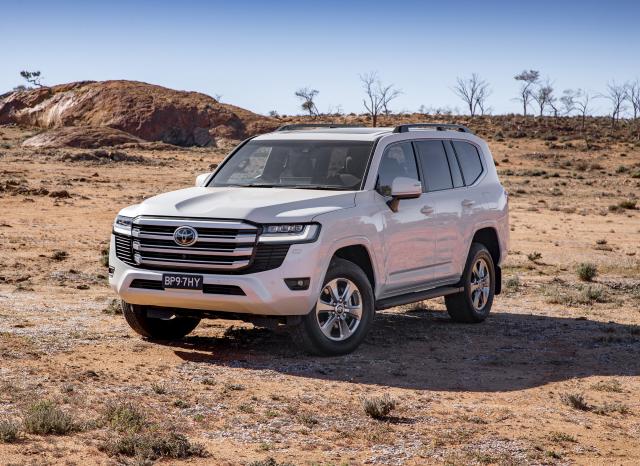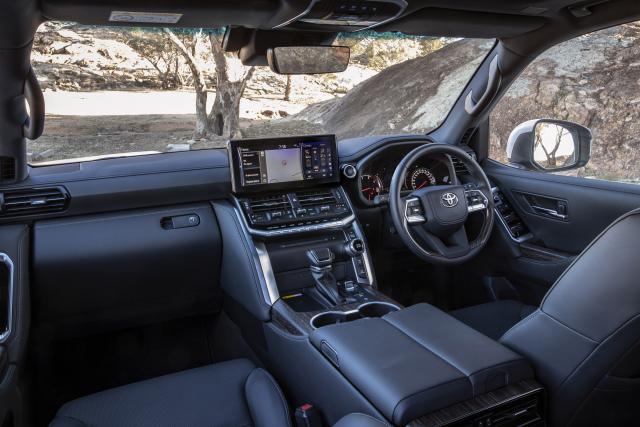By DEREK OGDEN, Marque Motoring
The Toyota LandCruiser dates back to the days when such vehicles were called wagons – none of this sports utility vehicle nonsense.
Unfortunately, they behaved as though they, at worst, had wooden wheels with iron rims; at best, solid rubber tyres.
One such ‘wagon’ was the LandCruiser, which made Aussie landfall in the 1950s on the Snowy Mountains Hydro Scheme.
It has not looked back.
The latest LandCruiser 300 came to market two years ago, with Toyota at pains to supply the vehicle with a stack of the latest automotive technology without lessening the iconic legacy the ‘300’ had attained.
This involved the inclusion of a new 3.3-litre V6 twin turbo diesel engine and advanced driver assistance technology underpinned by the maker’s new global architecture platform to provide quality on-road performance, plus off-road capability.
On the other hand, design engineers touched the exterior lightly, bearing in mind potential buyers’ loyalty to the traditional character of the large LandCruiser.
Joining the show were two new flagship variants, the luxury Sahara ZX and the highly specced off-road GR Sport, joining the existing GX, GXL, VX and Sahara.
Big ticket items all round, the entry-level GX sells for $89,990, plus on road costs, then follows five models ending up with the flagship Sahara ZX at $138,790.
Under test, taking in a week of town-and-country driving, carting varying loads, was the mid-range Sahara at $131,190.
Covered by the maker’s five-year, unlimited kilometre warranty, for the first time, the Toyota Service Advantage has been extended from three years/60,000 kilometres to five years/100,000 kilometres, providing customers with capped-price servicing for their first ten services at a cost of $375 each.
Intervals are every six months or 10,000km, whichever comes first.
Also, owners are able to extend the warranty on the engine and driveline to seven years by sticking to this schedule.
As mentioned above, while the exterior design is new, it does bear a resemblance to its predecessors in its squared-off all-round shape.
Further homage is paid to heritage in a wide, horizontal grille, flanked by slimline headlights, set higher to avoid damage in the rough.
Off-road ability is also improved with the rear bumper curving more steeply upwards for an increased departure angle, while the rear lights, arranged horizontally, integrate into the new aluminium rear hatch in a tapered rear, aiding aerodynamics.
The GXL features an 18-inch alloy six-spoke wheel with the Sahara adding a polished ‘super chrome metallic’ finish.
An array of improvements to noise, vibration and harshness ensures the 300 Series is the quietest and most comfortable LandCruiser yet.
In line with its flagship status, the cabin has been designed to wrap occupants in premium comfort, while having easy access to the latest multimedia technology.
Driver and front row are cosseted in seats, with bigger side bolsters, wide enough to accommodate the broad backs often part of the make-up of the typical LandCruiser owner.
The second row seats come in a 40:20:40 set-up and feature a reclining function as well as 92 mm of extra legroom.
They can be folded and tumbled forward to create a flat cargo space in the rear and give access to two dickie seats at the back.
Comfort here is limited to folk of smaller stature and then only on short journeys.
These two rear seats are brought into operation automatically by pressing a button in the wall of the cargo space under which is lodged a full-size spare wheel.
Seven-seat operation provides 1004 litres of cargo capacity and seating for five, with up to 1967 litres with both rear rows folded.
Head room is generous, despite moon roof workings, in all positions.
Storage includes a dual-opening centre console cool box, centre storage tray/box, overhead sunglasses holder, glovebox and a range of door bins and cup holders capable of holding 750 ml bottles.
Info and entertainment come big in the LandCruiser 300 Sahara with the latest generation multimedia system, including a 12.3-inch electronic multi-vision touchscreen – the largest on any Toyota vehicle – plus standard fitment of the rear seat entertainment system, consisting of a pair of 11.6-inch high-definition touchscreen displays, which are also capable of smartphone mirroring.
The multimedia system is compatible with Apple CarPlay and Android Auto, and features Bluetooth connectivity, AM / FM / DAB+ radio and voice recognition.
The system adds satellite navigation and a CD/DVD player and Qi wireless phone charging.
Two USB terminals and a 12V socket offer further charging options.
Superb sound is delivered through a JBL 14-speaker system and a full-colour head-up display.
At the heart of the latest LandCruiser 300 is a newly developed 3.3-litre V6 twin-turbo diesel engine, delivering better performance with improved fuel economy and emissions.
Tuned to produce 227 kW at 4000 rpm and 700 Nm over a wide 1600 to 2600 rpm band, this adds up to an improvement of 13.5 per cent and 7.7 per cent, respectively, over the previous V8.
Teamed with this motor, the new 10-speed automatic shifts twice as fast as the previous six-speed auto, and the additional ratios make a significant contribution to improved fuel economy.
Three drive modes are offered as standard – Eco, Normal and Sport – that adjust the throttle, transmission and steering parameters to suit the driving experience and conditions.
The LandCruiser 300 Series sees a vast expansion of the Toyota Safety Sense suite of driver assistance, combining radar and camera sensor technology.
For example, the long list of features starts with the pre-collision safety system, which now detects vehicles ahead and pedestrians day and night, as well as oncoming vehicles and cyclists during the day.
PCS now also includes intersection turn assist, and emergency steering assist on VX and above, for the first time on LandCruiser.
Other active safety features include lane trace assist and parking support brake, lane departure alert, rear cross-traffic alert, blind spot monitor, and automatic high beam.
The first mountain to tackle, as it were, was access to the LandCruiser 300 Sahara passenger cabin.
Judicious positioning of grab handles all round and side steps aided the ascent to all three rows of seats.
The big wagon buzzed off from rest on cue, courtesy of firm press of the accelerator pedal, mostly.
There were times when turbo contact was a little tardy. However, once up to speed things went along smoothly, the ten-speed automatic transmission and all-wheel drive transposing power to the road according to the driver’s instructions.
Toyota tells us the latest LandCruiser 300 consumes 8.9 litres of diesel per 100 kilometres on the combined urban/highway cycle.
Closest the test car achieved was 9.5 litres per 100 kilometres over a week of driving in varied conditions on bitumen.
As for ride, the Cruiser tended to rock ‘n’ roll over uneven surfaces at speed, while handling was surprising agile for a vehicle of its bulk.
There was even temptation to throw the big beast into fast bends.
Quite exhilarating, really.
In all the excitement, body temperatures were kept under control by a four-zone automatic climate-control system, with front and rear temperature sensors.
An automatic rear cooler had its own controls, with fans throughout the cabin ensuring plentiful airflow reached occupants, regardless of where they were sitting.
The legend that is the LandCruiser 300 shows no sign of coming to an end any time soon.
However, with fossil-fuelled vehicles facing a doomed future it remains to be seen how long this Cruiser can stay afloat.
RATINGS
Looks: 6/10
Performance: 7/10
Safety: 8/10
Thirst: 5/10
Practicality: 7/10
Comfort: 8/10
Tech: 7/10
Value: 7/10









